A Comparative Analysis of The Tempest, Endgame, and Related Texts
VerifiedAdded on 2023/05/26
|6
|1649
|447
Essay
AI Summary
This essay undertakes a comparative analysis of William Shakespeare's The Tempest and Samuel Beckett's Endgame, exploring their distinct thematic landscapes. The essay delves into The Tempest's exploration of justice, forgiveness, and consciousness, contrasting it with Endgame's examination of the cyclical nature of life. The analysis incorporates Sam McKegney's article "To Fight against Shame through Love" and Safiya Sinclair's Cannibal to enrich the discussion. The essay highlights the common thread of humanity across these texts, examining how each work represents different aspects of human experience, including compassion, the struggles of marginalized groups, and the complexities of power dynamics. The comparative approach reveals insights into how themes are treated across different eras and literary styles, offering a nuanced understanding of the human condition as portrayed in these works.
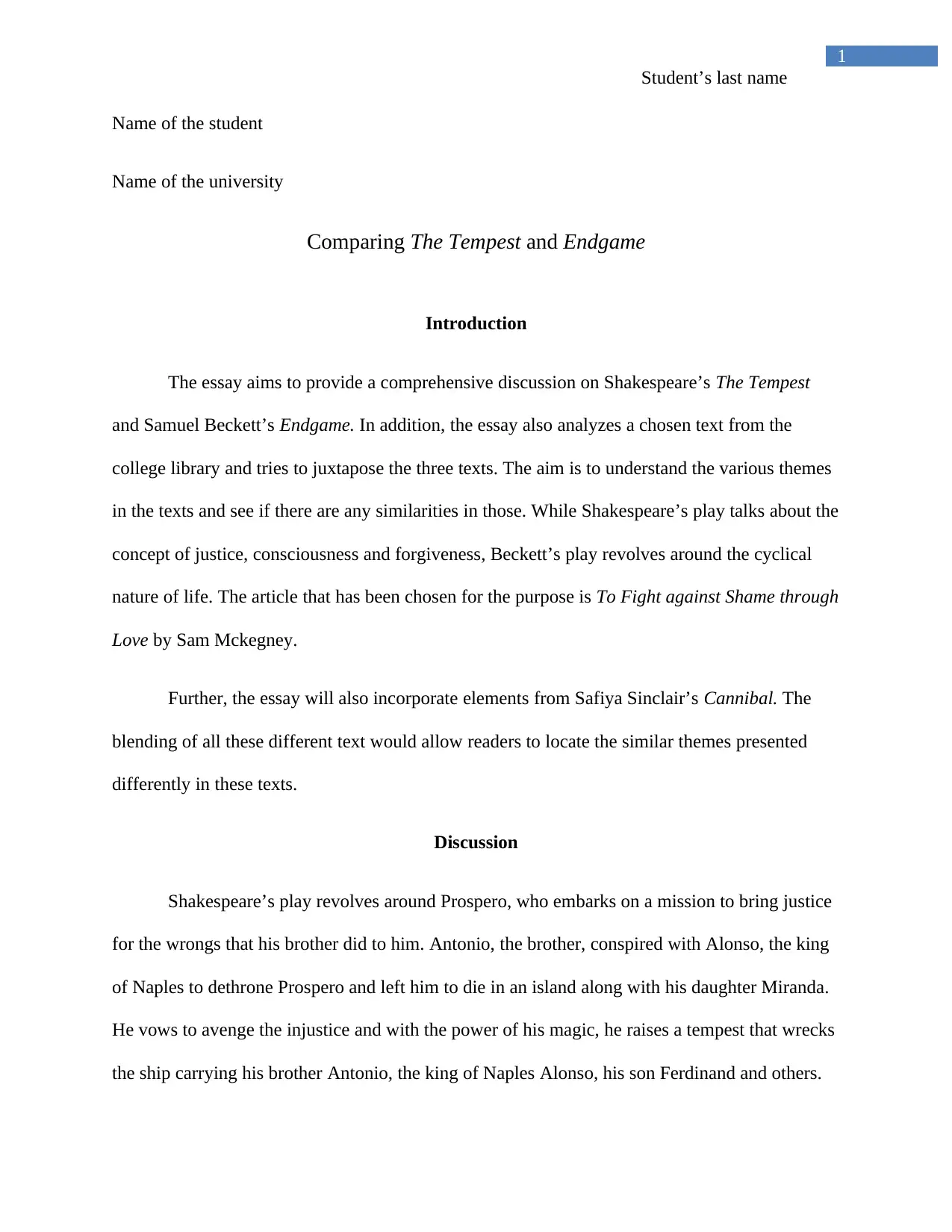
1
Student’s last name
Name of the student
Name of the university
Comparing The Tempest and Endgame
Introduction
The essay aims to provide a comprehensive discussion on Shakespeare’s The Tempest
and Samuel Beckett’s Endgame. In addition, the essay also analyzes a chosen text from the
college library and tries to juxtapose the three texts. The aim is to understand the various themes
in the texts and see if there are any similarities in those. While Shakespeare’s play talks about the
concept of justice, consciousness and forgiveness, Beckett’s play revolves around the cyclical
nature of life. The article that has been chosen for the purpose is To Fight against Shame through
Love by Sam Mckegney.
Further, the essay will also incorporate elements from Safiya Sinclair’s Cannibal. The
blending of all these different text would allow readers to locate the similar themes presented
differently in these texts.
Discussion
Shakespeare’s play revolves around Prospero, who embarks on a mission to bring justice
for the wrongs that his brother did to him. Antonio, the brother, conspired with Alonso, the king
of Naples to dethrone Prospero and left him to die in an island along with his daughter Miranda.
He vows to avenge the injustice and with the power of his magic, he raises a tempest that wrecks
the ship carrying his brother Antonio, the king of Naples Alonso, his son Ferdinand and others.
Student’s last name
Name of the student
Name of the university
Comparing The Tempest and Endgame
Introduction
The essay aims to provide a comprehensive discussion on Shakespeare’s The Tempest
and Samuel Beckett’s Endgame. In addition, the essay also analyzes a chosen text from the
college library and tries to juxtapose the three texts. The aim is to understand the various themes
in the texts and see if there are any similarities in those. While Shakespeare’s play talks about the
concept of justice, consciousness and forgiveness, Beckett’s play revolves around the cyclical
nature of life. The article that has been chosen for the purpose is To Fight against Shame through
Love by Sam Mckegney.
Further, the essay will also incorporate elements from Safiya Sinclair’s Cannibal. The
blending of all these different text would allow readers to locate the similar themes presented
differently in these texts.
Discussion
Shakespeare’s play revolves around Prospero, who embarks on a mission to bring justice
for the wrongs that his brother did to him. Antonio, the brother, conspired with Alonso, the king
of Naples to dethrone Prospero and left him to die in an island along with his daughter Miranda.
He vows to avenge the injustice and with the power of his magic, he raises a tempest that wrecks
the ship carrying his brother Antonio, the king of Naples Alonso, his son Ferdinand and others.
Paraphrase This Document
Need a fresh take? Get an instant paraphrase of this document with our AI Paraphraser
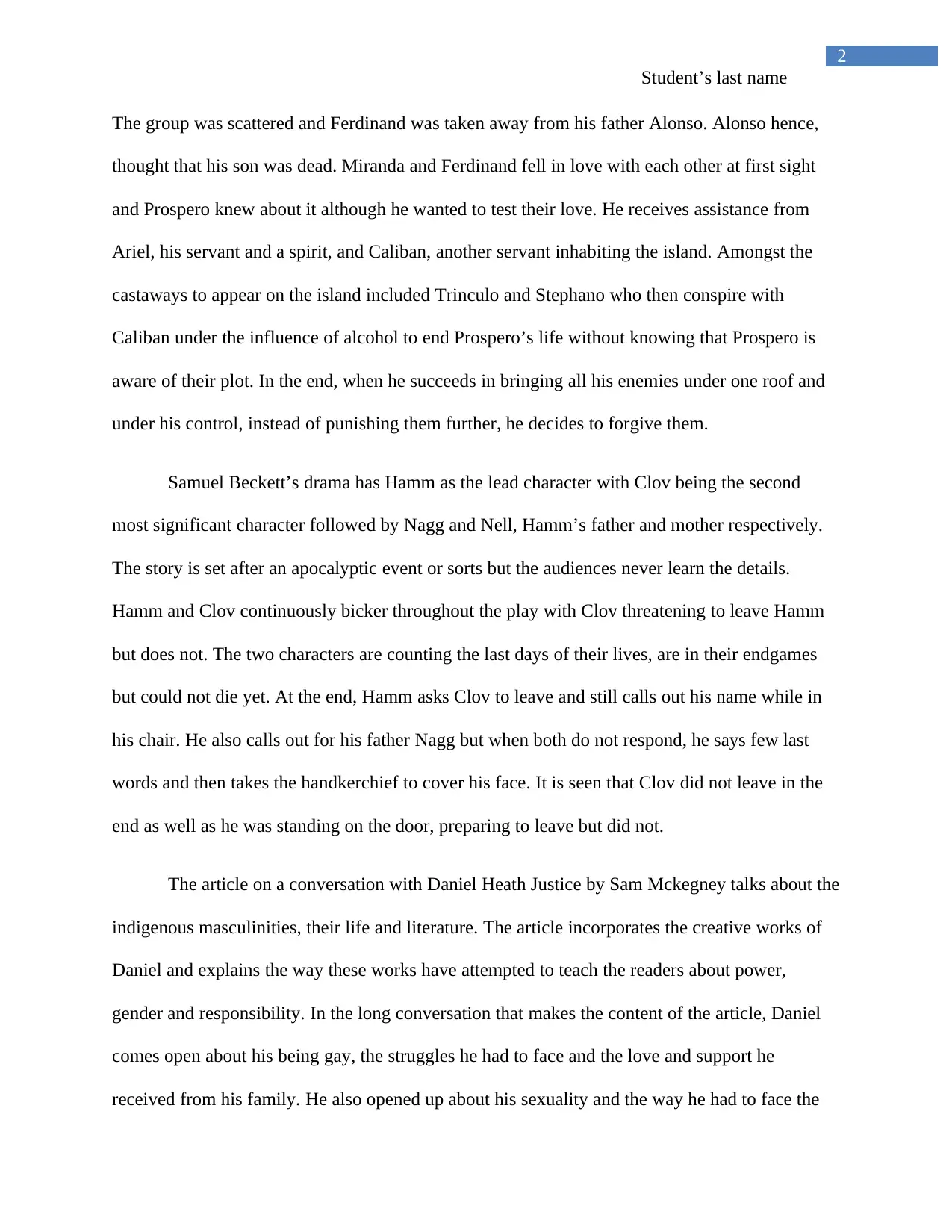
2
Student’s last name
The group was scattered and Ferdinand was taken away from his father Alonso. Alonso hence,
thought that his son was dead. Miranda and Ferdinand fell in love with each other at first sight
and Prospero knew about it although he wanted to test their love. He receives assistance from
Ariel, his servant and a spirit, and Caliban, another servant inhabiting the island. Amongst the
castaways to appear on the island included Trinculo and Stephano who then conspire with
Caliban under the influence of alcohol to end Prospero’s life without knowing that Prospero is
aware of their plot. In the end, when he succeeds in bringing all his enemies under one roof and
under his control, instead of punishing them further, he decides to forgive them.
Samuel Beckett’s drama has Hamm as the lead character with Clov being the second
most significant character followed by Nagg and Nell, Hamm’s father and mother respectively.
The story is set after an apocalyptic event or sorts but the audiences never learn the details.
Hamm and Clov continuously bicker throughout the play with Clov threatening to leave Hamm
but does not. The two characters are counting the last days of their lives, are in their endgames
but could not die yet. At the end, Hamm asks Clov to leave and still calls out his name while in
his chair. He also calls out for his father Nagg but when both do not respond, he says few last
words and then takes the handkerchief to cover his face. It is seen that Clov did not leave in the
end as well as he was standing on the door, preparing to leave but did not.
The article on a conversation with Daniel Heath Justice by Sam Mckegney talks about the
indigenous masculinities, their life and literature. The article incorporates the creative works of
Daniel and explains the way these works have attempted to teach the readers about power,
gender and responsibility. In the long conversation that makes the content of the article, Daniel
comes open about his being gay, the struggles he had to face and the love and support he
received from his family. He also opened up about his sexuality and the way he had to face the
Student’s last name
The group was scattered and Ferdinand was taken away from his father Alonso. Alonso hence,
thought that his son was dead. Miranda and Ferdinand fell in love with each other at first sight
and Prospero knew about it although he wanted to test their love. He receives assistance from
Ariel, his servant and a spirit, and Caliban, another servant inhabiting the island. Amongst the
castaways to appear on the island included Trinculo and Stephano who then conspire with
Caliban under the influence of alcohol to end Prospero’s life without knowing that Prospero is
aware of their plot. In the end, when he succeeds in bringing all his enemies under one roof and
under his control, instead of punishing them further, he decides to forgive them.
Samuel Beckett’s drama has Hamm as the lead character with Clov being the second
most significant character followed by Nagg and Nell, Hamm’s father and mother respectively.
The story is set after an apocalyptic event or sorts but the audiences never learn the details.
Hamm and Clov continuously bicker throughout the play with Clov threatening to leave Hamm
but does not. The two characters are counting the last days of their lives, are in their endgames
but could not die yet. At the end, Hamm asks Clov to leave and still calls out his name while in
his chair. He also calls out for his father Nagg but when both do not respond, he says few last
words and then takes the handkerchief to cover his face. It is seen that Clov did not leave in the
end as well as he was standing on the door, preparing to leave but did not.
The article on a conversation with Daniel Heath Justice by Sam Mckegney talks about the
indigenous masculinities, their life and literature. The article incorporates the creative works of
Daniel and explains the way these works have attempted to teach the readers about power,
gender and responsibility. In the long conversation that makes the content of the article, Daniel
comes open about his being gay, the struggles he had to face and the love and support he
received from his family. He also opened up about his sexuality and the way he had to face the
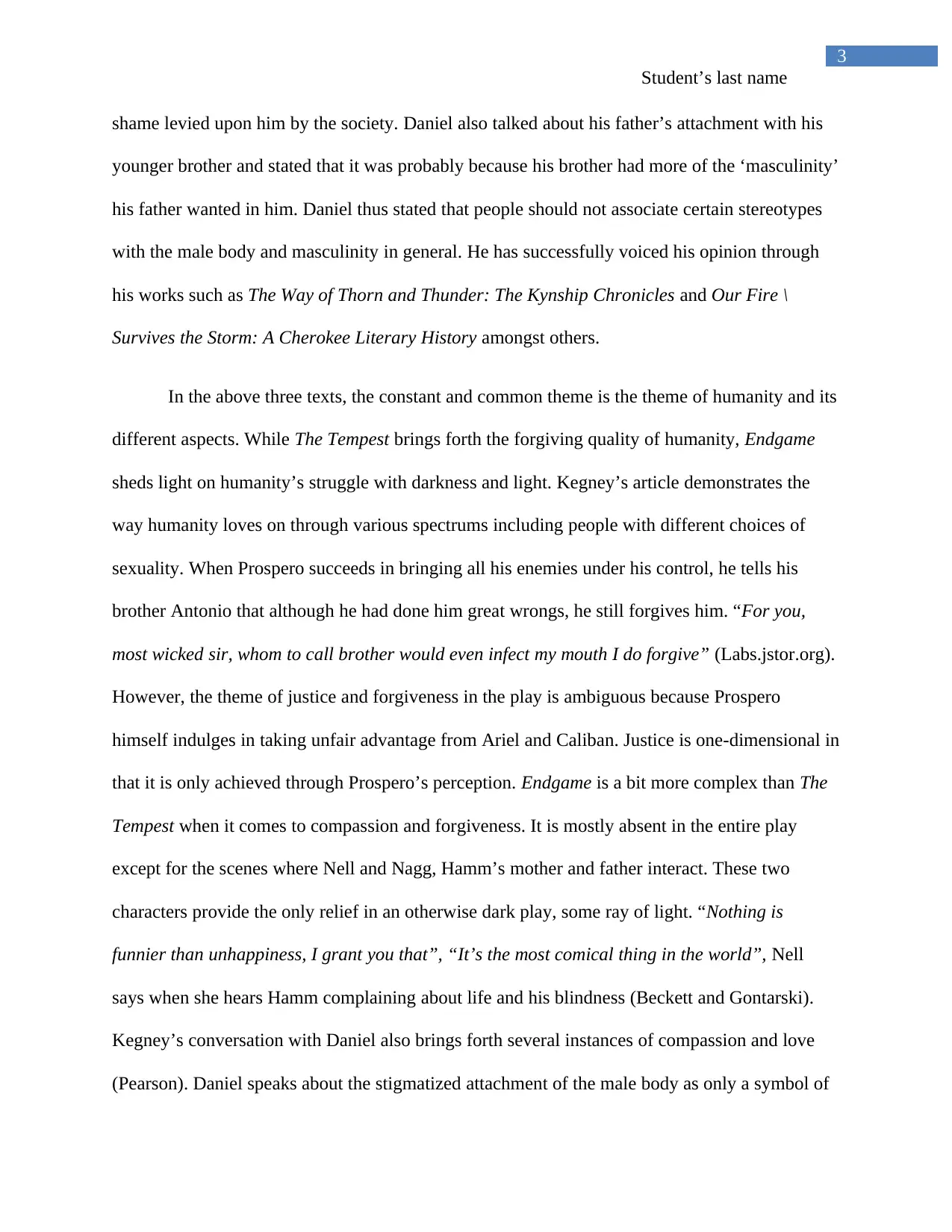
3
Student’s last name
shame levied upon him by the society. Daniel also talked about his father’s attachment with his
younger brother and stated that it was probably because his brother had more of the ‘masculinity’
his father wanted in him. Daniel thus stated that people should not associate certain stereotypes
with the male body and masculinity in general. He has successfully voiced his opinion through
his works such as The Way of Thorn and Thunder: The Kynship Chronicles and Our Fire \
Survives the Storm: A Cherokee Literary History amongst others.
In the above three texts, the constant and common theme is the theme of humanity and its
different aspects. While The Tempest brings forth the forgiving quality of humanity, Endgame
sheds light on humanity’s struggle with darkness and light. Kegney’s article demonstrates the
way humanity loves on through various spectrums including people with different choices of
sexuality. When Prospero succeeds in bringing all his enemies under his control, he tells his
brother Antonio that although he had done him great wrongs, he still forgives him. “For you,
most wicked sir, whom to call brother would even infect my mouth I do forgive” (Labs.jstor.org).
However, the theme of justice and forgiveness in the play is ambiguous because Prospero
himself indulges in taking unfair advantage from Ariel and Caliban. Justice is one-dimensional in
that it is only achieved through Prospero’s perception. Endgame is a bit more complex than The
Tempest when it comes to compassion and forgiveness. It is mostly absent in the entire play
except for the scenes where Nell and Nagg, Hamm’s mother and father interact. These two
characters provide the only relief in an otherwise dark play, some ray of light. “Nothing is
funnier than unhappiness, I grant you that”, “It’s the most comical thing in the world”, Nell
says when she hears Hamm complaining about life and his blindness (Beckett and Gontarski).
Kegney’s conversation with Daniel also brings forth several instances of compassion and love
(Pearson). Daniel speaks about the stigmatized attachment of the male body as only a symbol of
Student’s last name
shame levied upon him by the society. Daniel also talked about his father’s attachment with his
younger brother and stated that it was probably because his brother had more of the ‘masculinity’
his father wanted in him. Daniel thus stated that people should not associate certain stereotypes
with the male body and masculinity in general. He has successfully voiced his opinion through
his works such as The Way of Thorn and Thunder: The Kynship Chronicles and Our Fire \
Survives the Storm: A Cherokee Literary History amongst others.
In the above three texts, the constant and common theme is the theme of humanity and its
different aspects. While The Tempest brings forth the forgiving quality of humanity, Endgame
sheds light on humanity’s struggle with darkness and light. Kegney’s article demonstrates the
way humanity loves on through various spectrums including people with different choices of
sexuality. When Prospero succeeds in bringing all his enemies under his control, he tells his
brother Antonio that although he had done him great wrongs, he still forgives him. “For you,
most wicked sir, whom to call brother would even infect my mouth I do forgive” (Labs.jstor.org).
However, the theme of justice and forgiveness in the play is ambiguous because Prospero
himself indulges in taking unfair advantage from Ariel and Caliban. Justice is one-dimensional in
that it is only achieved through Prospero’s perception. Endgame is a bit more complex than The
Tempest when it comes to compassion and forgiveness. It is mostly absent in the entire play
except for the scenes where Nell and Nagg, Hamm’s mother and father interact. These two
characters provide the only relief in an otherwise dark play, some ray of light. “Nothing is
funnier than unhappiness, I grant you that”, “It’s the most comical thing in the world”, Nell
says when she hears Hamm complaining about life and his blindness (Beckett and Gontarski).
Kegney’s conversation with Daniel also brings forth several instances of compassion and love
(Pearson). Daniel speaks about the stigmatized attachment of the male body as only a symbol of
⊘ This is a preview!⊘
Do you want full access?
Subscribe today to unlock all pages.

Trusted by 1+ million students worldwide
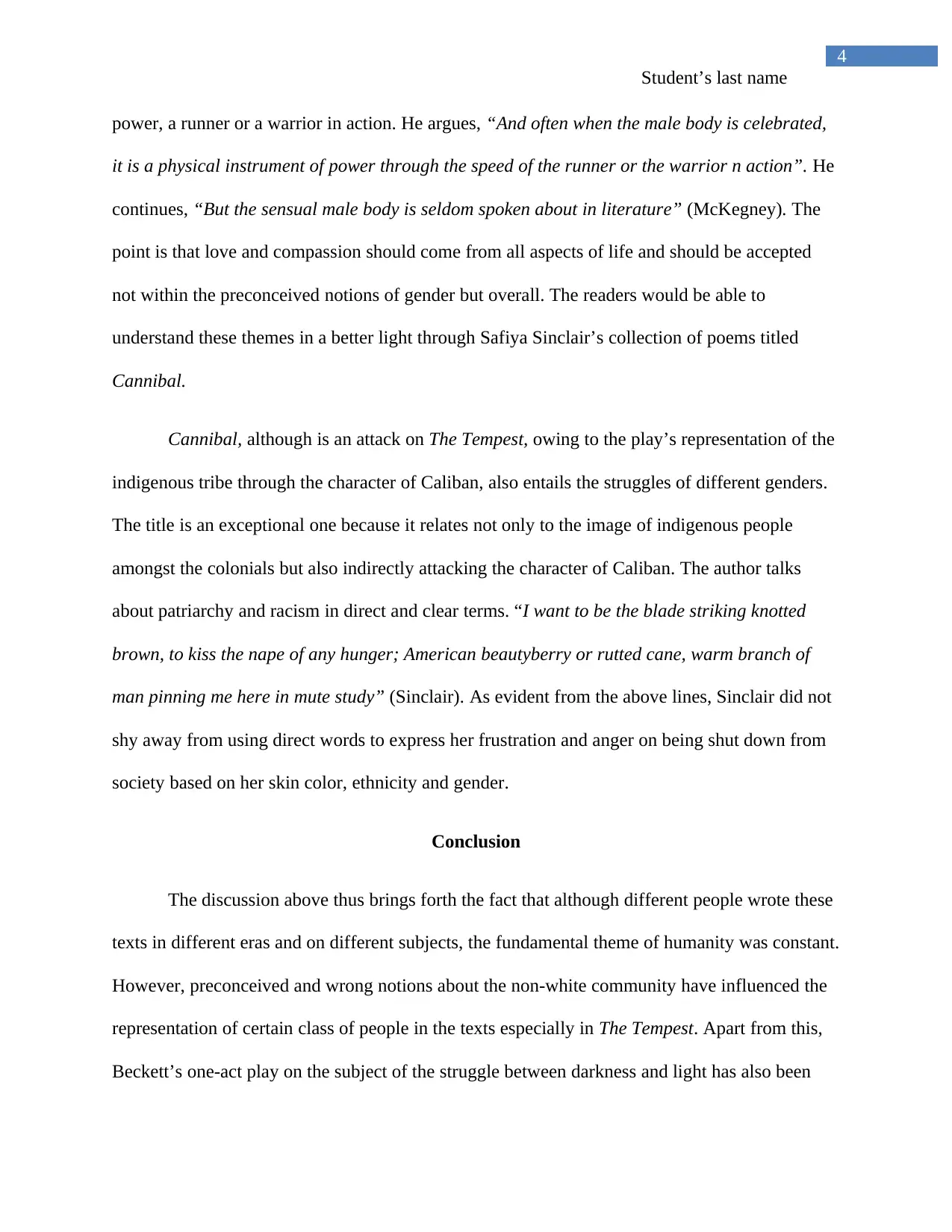
4
Student’s last name
power, a runner or a warrior in action. He argues, “And often when the male body is celebrated,
it is a physical instrument of power through the speed of the runner or the warrior n action”. He
continues, “But the sensual male body is seldom spoken about in literature” (McKegney). The
point is that love and compassion should come from all aspects of life and should be accepted
not within the preconceived notions of gender but overall. The readers would be able to
understand these themes in a better light through Safiya Sinclair’s collection of poems titled
Cannibal.
Cannibal, although is an attack on The Tempest, owing to the play’s representation of the
indigenous tribe through the character of Caliban, also entails the struggles of different genders.
The title is an exceptional one because it relates not only to the image of indigenous people
amongst the colonials but also indirectly attacking the character of Caliban. The author talks
about patriarchy and racism in direct and clear terms. “I want to be the blade striking knotted
brown, to kiss the nape of any hunger; American beautyberry or rutted cane, warm branch of
man pinning me here in mute study” (Sinclair). As evident from the above lines, Sinclair did not
shy away from using direct words to express her frustration and anger on being shut down from
society based on her skin color, ethnicity and gender.
Conclusion
The discussion above thus brings forth the fact that although different people wrote these
texts in different eras and on different subjects, the fundamental theme of humanity was constant.
However, preconceived and wrong notions about the non-white community have influenced the
representation of certain class of people in the texts especially in The Tempest. Apart from this,
Beckett’s one-act play on the subject of the struggle between darkness and light has also been
Student’s last name
power, a runner or a warrior in action. He argues, “And often when the male body is celebrated,
it is a physical instrument of power through the speed of the runner or the warrior n action”. He
continues, “But the sensual male body is seldom spoken about in literature” (McKegney). The
point is that love and compassion should come from all aspects of life and should be accepted
not within the preconceived notions of gender but overall. The readers would be able to
understand these themes in a better light through Safiya Sinclair’s collection of poems titled
Cannibal.
Cannibal, although is an attack on The Tempest, owing to the play’s representation of the
indigenous tribe through the character of Caliban, also entails the struggles of different genders.
The title is an exceptional one because it relates not only to the image of indigenous people
amongst the colonials but also indirectly attacking the character of Caliban. The author talks
about patriarchy and racism in direct and clear terms. “I want to be the blade striking knotted
brown, to kiss the nape of any hunger; American beautyberry or rutted cane, warm branch of
man pinning me here in mute study” (Sinclair). As evident from the above lines, Sinclair did not
shy away from using direct words to express her frustration and anger on being shut down from
society based on her skin color, ethnicity and gender.
Conclusion
The discussion above thus brings forth the fact that although different people wrote these
texts in different eras and on different subjects, the fundamental theme of humanity was constant.
However, preconceived and wrong notions about the non-white community have influenced the
representation of certain class of people in the texts especially in The Tempest. Apart from this,
Beckett’s one-act play on the subject of the struggle between darkness and light has also been
Paraphrase This Document
Need a fresh take? Get an instant paraphrase of this document with our AI Paraphraser

5
Student’s last name
discussed. Along with this, Mckegney’s article on the indigenous and gay writer Daniel Heath
Justice explains the need for people to embrace compassion and love, sexuality and sensuousness
in all its form and body. Overall, the discussion found an inherent relation between the three
distinct texts when juxtaposed together.
Student’s last name
discussed. Along with this, Mckegney’s article on the indigenous and gay writer Daniel Heath
Justice explains the need for people to embrace compassion and love, sexuality and sensuousness
in all its form and body. Overall, the discussion found an inherent relation between the three
distinct texts when juxtaposed together.
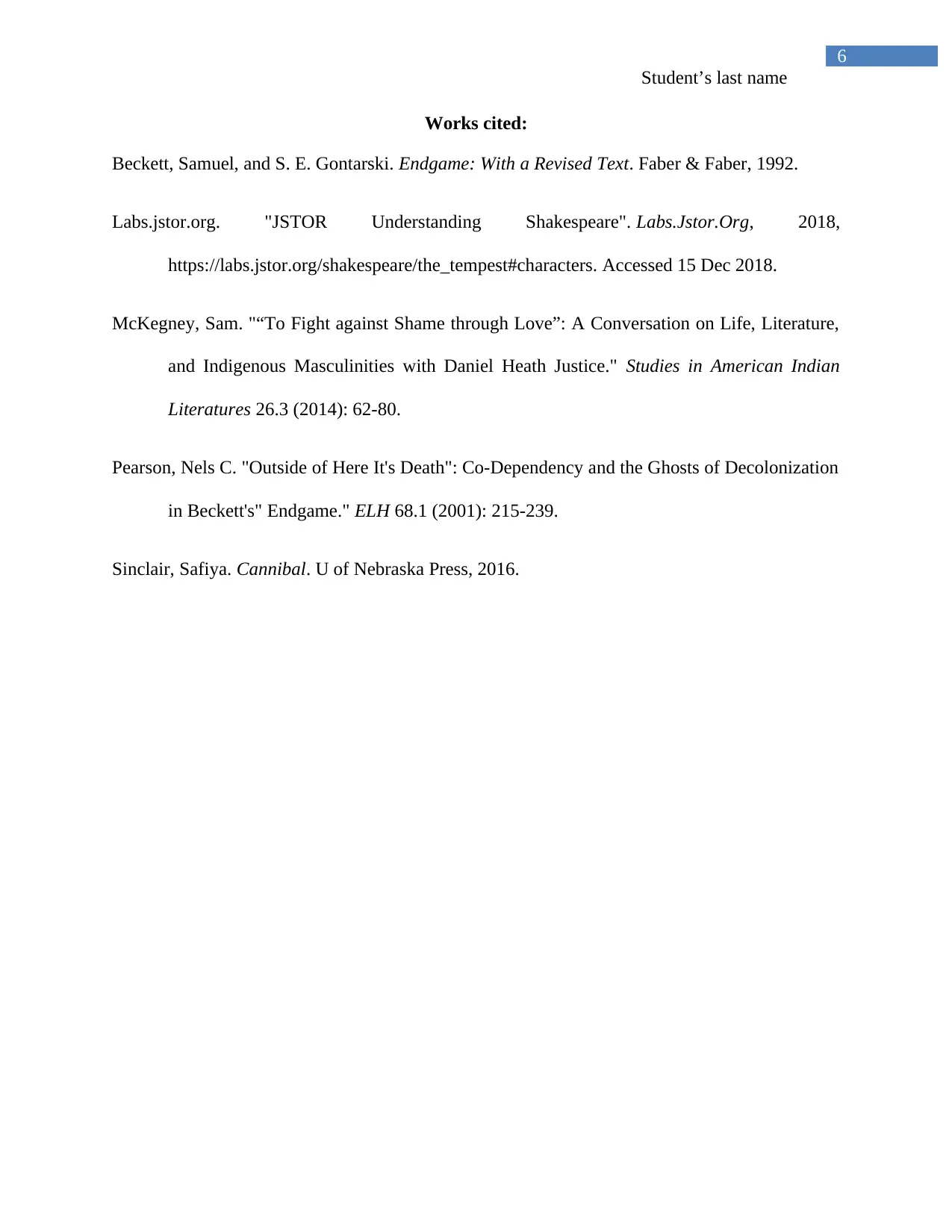
6
Student’s last name
Works cited:
Beckett, Samuel, and S. E. Gontarski. Endgame: With a Revised Text. Faber & Faber, 1992.
Labs.jstor.org. "JSTOR Understanding Shakespeare". Labs.Jstor.Org, 2018,
https://labs.jstor.org/shakespeare/the_tempest#characters. Accessed 15 Dec 2018.
McKegney, Sam. "“To Fight against Shame through Love”: A Conversation on Life, Literature,
and Indigenous Masculinities with Daniel Heath Justice." Studies in American Indian
Literatures 26.3 (2014): 62-80.
Pearson, Nels C. "Outside of Here It's Death": Co-Dependency and the Ghosts of Decolonization
in Beckett's" Endgame." ELH 68.1 (2001): 215-239.
Sinclair, Safiya. Cannibal. U of Nebraska Press, 2016.
Student’s last name
Works cited:
Beckett, Samuel, and S. E. Gontarski. Endgame: With a Revised Text. Faber & Faber, 1992.
Labs.jstor.org. "JSTOR Understanding Shakespeare". Labs.Jstor.Org, 2018,
https://labs.jstor.org/shakespeare/the_tempest#characters. Accessed 15 Dec 2018.
McKegney, Sam. "“To Fight against Shame through Love”: A Conversation on Life, Literature,
and Indigenous Masculinities with Daniel Heath Justice." Studies in American Indian
Literatures 26.3 (2014): 62-80.
Pearson, Nels C. "Outside of Here It's Death": Co-Dependency and the Ghosts of Decolonization
in Beckett's" Endgame." ELH 68.1 (2001): 215-239.
Sinclair, Safiya. Cannibal. U of Nebraska Press, 2016.
⊘ This is a preview!⊘
Do you want full access?
Subscribe today to unlock all pages.

Trusted by 1+ million students worldwide
1 out of 6
Your All-in-One AI-Powered Toolkit for Academic Success.
+13062052269
info@desklib.com
Available 24*7 on WhatsApp / Email
![[object Object]](/_next/static/media/star-bottom.7253800d.svg)
Unlock your academic potential
Copyright © 2020–2026 A2Z Services. All Rights Reserved. Developed and managed by ZUCOL.


